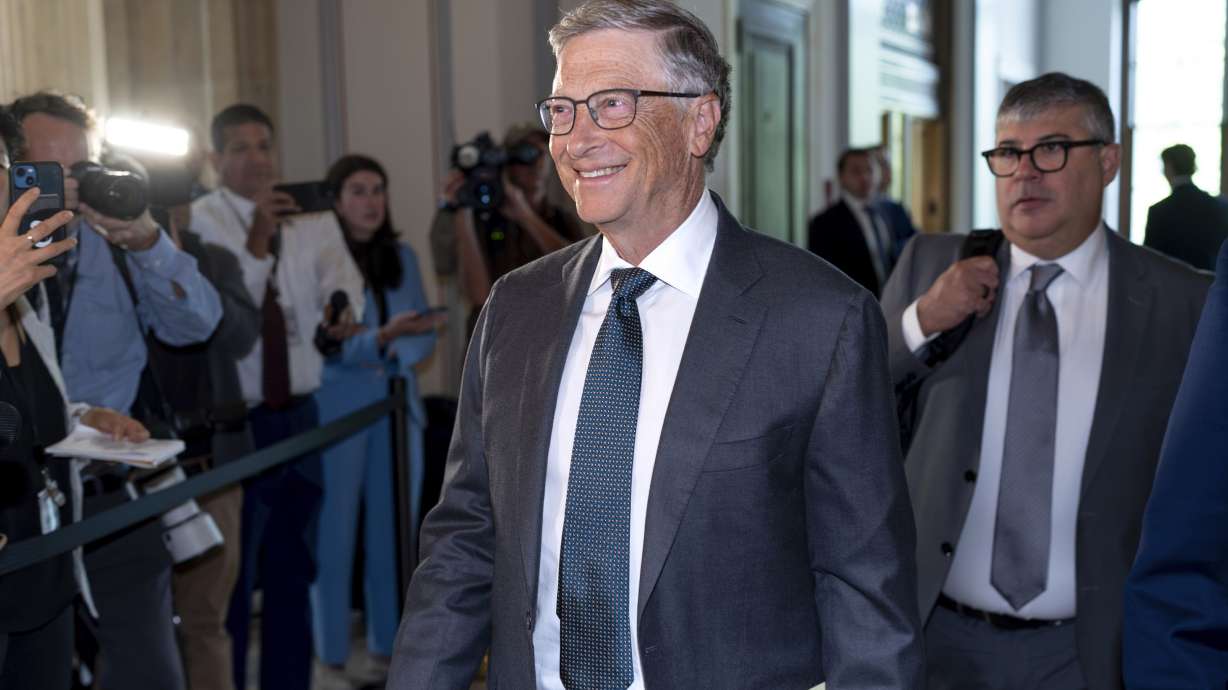Estimated read time: 4-5 minutes
This archived news story is available only for your personal, non-commercial use. Information in the story may be outdated or superseded by additional information. Reading or replaying the story in its archived form does not constitute a republication of the story.
SALT LAKE CITY — Earlier this year, Microsoft co-founder Bill Gates warned emerging artificial intelligence tools were poised to fundamentally reshape the most popular uses of the internet, potentially killing off powerhouses like Google and Amazon and may eventually power a new wave of worker-droids.
But multibillionaire Gates, who stepped away from Microsoft's day-to-day operations in 2008 to engage in full-time philanthropic endeavors, focused on more optimistic potentials for AI in his annual year-end letter released Tuesday.
At a May artificial intelligence conference hosted by financial giant Goldman Sachs and Silicon Valley venture firm SV Angel, Gates said he believed a yet-to-be-developed AI-driven personal assistant is likely to take over humdrum human tasks like searching the internet, shopping and even engaging with online productivity tools. That's because the new digital helpers will be keyed in to users' needs in a way that will obsolesce many of the current, mainstay uses of the internet.
"Whoever wins the personal agent, that's the big thing, because you will never go to a search site again, you will never go to a productivity site, you'll never go to Amazon again," Gates said in May.
He also suggested that, in the future, AI-powered humanoid robots will become more affordable than human laborers and begin replacing blue-collar workers.
Gates chose, however, to focus on more altruistic potentials for artificial intelligence in a year-in-review posting Tuesday on his "Gates Notes" blog.
Gates said putting innovation to work has been a core motivator throughout his life and was the impetus behind Microsoft as well as the philanthropic organization, the Gates Foundation, which he and his ex-wife Melinda Gates founded in 1994.
Gates believes AI-powered innovations will begin fundamentally reshaping the world and he sees opportunity for the new technology to help abate some of the most critical issues facing humanity.
"In a world with limited resources, you have to find ways to maximize impact," Gates wrote. "Innovation is the key to getting the most out of every dollar spent. And artificial intelligence is about to accelerate the rate of new discoveries at a pace we've never seen before."
Here are some of the pressing questions Gates believes may be addressed by emerging AI tools:
Can AI combat antibiotic resistance?
Gates notes the work of Nana Kofi Quakyi from the Aurum Institute in Ghana who is working on an AI-powered tool that helps health workers prescribe antibiotics without contributing to antimicrobial resistance. The tool will comb through all the available information — including local clinical guidelines and health surveillance data about which pathogens are currently at risk of developing resistance in the area — and make suggestions for the best drug, dosage, and duration.
Can AI bring personalized tutors to every student?
Gates is impressed with a number of new education-focused AI tools that are approaching the challenge by tailoring lessons to the needs of individual users while also incorporating culture-specific customization. Gates cites Khanmigo, MATHia and Somanasi as platforms that are showing positive outcomes with this approach.
Can AI help treat high-risk pregnancies?
Gates notes that, across the globe, a woman dies in childbirth every two minutes. Gates said he met earlier this year with researchers from ARMMAN, who hope to use artificial intelligence to improve the odds for new mothers in India. ARMMAN's large language model is being developed to act as a co-pilot for health workers treating high-risk pregnancies. It can be used in both English and Telugu, and automatically adjusts to the experience level of the person using it — whether you're a brand-new nurse or a midwife with decades of experience.
Could AI make medical information easier to access for every health worker?
Gates wrote about Maryam Mustafa's team, working on a voice-enabled mobile app that would make it a lot easier for maternal health workers in Pakistan to create medical records. It asks a series of prompts about a patient and uses the responses to fill out a standard medical record. Arming health workers with more data will hopefully improve the country's pregnancy outcomes, which are among the worst in the world.
Gates wrote in his year-end posting that "it's clearer than ever how AI can be used to improve access to education, mental health, and more" and pledged to support emerging AI-driven technologies aiming to better the world.
"It motivates me to make sure this technology helps reduce — and doesn't contribute to — the awful inequities we see around the world," Gates wrote. "I've always been a firm believer in the power of innovation to offer every child an equal chance to survive and thrive. AI is no exception."










